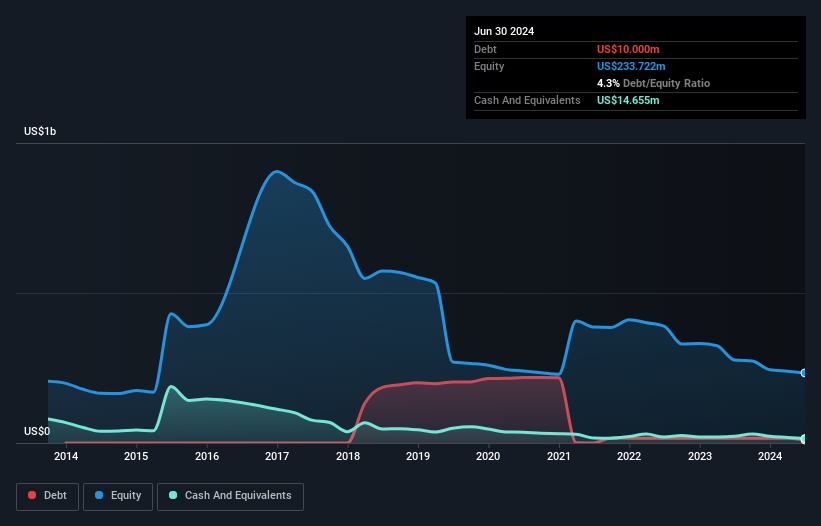Warren Buffett famously said, 'Volatility is far from synonymous with risk.' It's only natural to consider a company's balance sheet when you examine how risky it is, since debt is often involved when a business collapses. As with many other companies comScore, Inc. (NASDAQ:SCOR) makes use of debt. But the more important question is: how much risk is that debt creating?
When Is Debt A Problem?
Debt assists a business until the business has trouble paying it off, either with new capital or with free cash flow. Part and parcel of capitalism is the process of 'creative destruction' where failed businesses are mercilessly liquidated by their bankers. While that is not too common, we often do see indebted companies permanently diluting shareholders because lenders force them to raise capital at a distressed price. Having said that, the most common situation is where a company manages its debt reasonably well - and to its own advantage. The first step when considering a company's debt levels is to consider its cash and debt together.
View our latest analysis for comScore
How Much Debt Does comScore Carry?
As you can see below, comScore had US$10.0m of debt at June 2024, down from US$16.0m a year prior. However, it does have US$14.7m in cash offsetting this, leading to net cash of US$4.66m.

How Strong Is comScore's Balance Sheet?
We can see from the most recent balance sheet that comScore had liabilities of US$174.8m falling due within a year, and liabilities of US$65.7m due beyond that. On the other hand, it had cash of US$14.7m and US$53.9m worth of receivables due within a year. So its liabilities outweigh the sum of its cash and (near-term) receivables by US$171.9m.
This deficit casts a shadow over the US$32.3m company, like a colossus towering over mere mortals. So we'd watch its balance sheet closely, without a doubt. At the end of the day, comScore would probably need a major re-capitalization if its creditors were to demand repayment. Given that comScore has more cash than debt, we're pretty confident it can handle its debt, despite the fact that it has a lot of liabilities in total.
Although comScore made a loss at the EBIT level, last year, it was also good to see that it generated US$12m in EBIT over the last twelve months. The balance sheet is clearly the area to focus on when you are analysing debt. But ultimately the future profitability of the business will decide if comScore can strengthen its balance sheet over time. So if you want to see what the professionals think, you might find this free report on analyst profit forecasts to be interesting.
Finally, a business needs free cash flow to pay off debt; accounting profits just don't cut it. comScore may have net cash on the balance sheet, but it is still interesting to look at how well the business converts its earnings before interest and tax (EBIT) to free cash flow, because that will influence both its need for, and its capacity to manage debt. Looking at the most recent year, comScore recorded free cash flow of 37% of its EBIT, which is weaker than we'd expect. That weak cash conversion makes it more difficult to handle indebtedness.
Summing Up
Although comScore's balance sheet isn't particularly strong, due to the total liabilities, it is clearly positive to see that it has net cash of US$4.66m. Despite its cash we think that comScore seems to struggle to handle its total liabilities, so we are wary of the stock. When analysing debt levels, the balance sheet is the obvious place to start. However, not all investment risk resides within the balance sheet - far from it. We've identified 3 warning signs with comScore , and understanding them should be part of your investment process.
Of course, if you're the type of investor who prefers buying stocks without the burden of debt, then don't hesitate to discover our exclusive list of net cash growth stocks, today.
Valuation is complex, but we're here to simplify it.
Discover if comScore might be undervalued or overvalued with our detailed analysis, featuring fair value estimates, potential risks, dividends, insider trades, and its financial condition.
Access Free AnalysisHave feedback on this article? Concerned about the content? Get in touch with us directly. Alternatively, email editorial-team (at) simplywallst.com.
This article by Simply Wall St is general in nature. We provide commentary based on historical data and analyst forecasts only using an unbiased methodology and our articles are not intended to be financial advice. It does not constitute a recommendation to buy or sell any stock, and does not take account of your objectives, or your financial situation. We aim to bring you long-term focused analysis driven by fundamental data. Note that our analysis may not factor in the latest price-sensitive company announcements or qualitative material. Simply Wall St has no position in any stocks mentioned.
About NasdaqGS:SCOR
comScore
Operates as an information and analytics company that measures audiences, consumer behavior, and advertising across media platforms in the United States, Europe, Latin America, Canada, and internationally.
Excellent balance sheet with slight risk.
Similar Companies
Market Insights
Community Narratives


Recently Updated Narratives

Early mover in a fast growing industry. Likely to experience share price volatility as they scale


Near zero debt, Japan centric focus provides future growth

TAV Havalimanlari Holding will fly high with 25.68% revenue growth
Popular Narratives


MicroVision will explode future revenue by 380.37% with a vision towards success


The company that turned a verb into a global necessity and basically runs the modern internet, digital ads, smartphones, maps, and AI.



